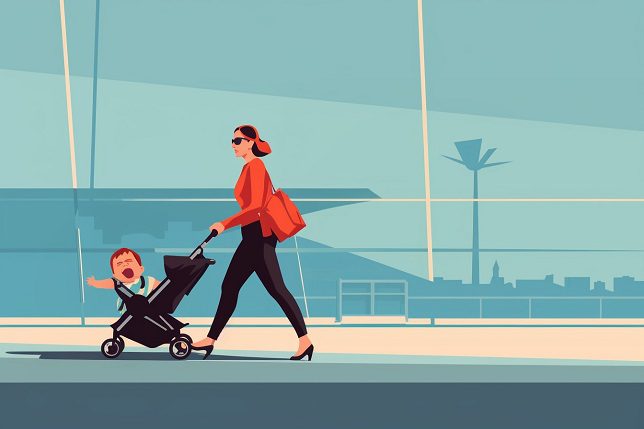 If you’ve heard a lot of talk about banning babies from planes, here’s why: A European charter airline just announced it would start offering an adults-only section on some of its transatlantic flights in November.
If you’ve heard a lot of talk about banning babies from planes, here’s why: A European charter airline just announced it would start offering an adults-only section on some of its transatlantic flights in November.
That has some air travellers fantasizing about baby-free flights. And you know what? Maybe they’re onto something.
Airlines already place common-sense limits on young passengers. For example, infants younger than seven days of age on United Airlines can’t fly. And lately, there’s been an earnest discussion about keeping little ones out of business class. Why draw a line there?
No one’s suggesting a ban on babies or kids from all flights. That wouldn’t make sense for passengers or airlines.
“Banning children from flights would be a financial disaster for airlines,” explains Mike Taylor, J.D. Power’s managing director for travel and hospitality. That’s because leisure travel currently accounts for two-thirds of all air travel revenues, and people sometimes take their kids on vacation with them despite the screams, tantrums and meltdowns (theirs and their kids’).
But maybe it’s time for a bit of course correction regarding children. Maybe there are places we should keep baby-free, such as a section of the plane or the entire plane. I’ll get to that in just a minute.
What’s an “Only Adults” section on a plane?
The debate over kids on planes started when Corendon announced it would begin selling an “Only Adults” section for passengers 16 and older on flights between Amsterdam and the Caribbean island of Curaçao.
The “Only Adults” zone in the front section of Corendon’s Airbus A350 consists of nine XL seats with extra legroom and 93 standard seats. The team will be partitioned from the rest of the aircraft by walls and curtains, creating a shielded environment “that contributes to a quiet and relaxing flight,” according to the company.
One of the primary motivations for the airline seems to be money. A seat reservation in the “Only Adults” zone costs an additional $48 per flight. An XL seat in the section costs an extra $106 each way. But Corendon says it will also benefit passengers because a select few will arrive in the Dutch Caribbean well-rested and ready for their vacation.
“This zone on the plane is intended for travellers travelling without children and business travellers who want to work in a quiet environment,” it says in a news release.
I suspect I know why Corendon did not answer my questions about its new “Only Adults” section. This is a hot-button issue for air travellers.
Do babies belong on flights? Some passengers think so.
Some passengers believe airlines shouldn’t restrict young passengers from flying anywhere.
“This whole discussion is nonsense,” says Corinne McDermott, founder of Have Baby Will Travel, a family travel website. “People seem to forget that babies and toddlers are people. We want our children to grow up to be the open-minded and caring individuals who would offer a helping hand to a parent instead of the cold shoulder. Don’t we?”
Colleen Carswell, a hospitality consultant and family travel expert, says restricting children may be easy, but it will have long-term consequences.
“I don’t think they’re going to like the humans they grow up to be,” she says.
According to Carswell, the solution to noisy kids isn’t to keep them isolated at home. This does a “tremendous disservice” to the human collective by raising children with shame and judgment instead of compassion. Instead, she suggests we welcome all passengers on board, regardless of age.
They’re not wrong. I’m grateful airlines allowed babies and young children on flights when I was a young father. I took my son, Aren, on his first flight when he was barely a month old. When he was a toddler, we flew with him to Europe and were lucky enough to get an upgrade to business class. Today, Aren is a well-adjusted world traveller who speaks three languages. If I couldn’t fly with him as a boy, pulling that off might not have been easy.
Why kids don’t belong on planes.
There’s an equally compelling argument that we should place sensible limits on babies. Some may have physiological challenges that make a flight unbearable. Others may not have the temperament to sit in a pressurized aluminium tube for hours.
Etiquette consultant Jodi RR Smith admits she has dreamed of child-free flights, although she thinks it will never happen. She says the strongest argument is that keeping kids grounded is best for them. Some are just not ready to sit still for a 12-hour flight. But one of the biggest challenges for babies and toddlers is the pressure changes on the climb and descent from cruising altitude.
“The child is often in excruciating pain, and it’s heart-wrenching for the parent who both wants to soothe the baby and is mortified at disturbing others,” she says.
Shelley Hunter, an innkeeper from Quincy, Calif., says airlines should be able to exclude kids from some flights. She recalls a recent flight from Reno to San Diego where she wishes it had been “Only Adults.”
“There was a toddler who screamed at the top of his lungs and kicked the back of my seat for the entire flight,” she recalls. “The parents kept telling him what a good boy he was. He was not!”
No wonder 77% of parents admit they’ve dreaded flying with their kids, according to a survey by private air transportation company KinectAir. The parents say their kids are too loud, and keeping them occupied is challenging.
All fair points. I’ve also found myself trapped on a plane with a screaming child (sometimes my own) and wish there were a way to avoid it. So what’s the solution?
Maybe it’s time for kid-free flights.
Before I had kids, I might have taken the radical and impractical position that we should ban babies from every flight. Wait until the kids are old enough to sit quietly and equalize their ears before subjecting themselves to the indignities of air travel. Or, if I wanted the website traffic, I could argue that kids under 16 should stay home. But I have three kids — and I know better.
Perhaps Corendon has the right idea. Most of us agree that kids don’t belong in places like bars, trade shows, and fine-dining restaurants. What harm could come from offering child-free sections — or even child-free flights?
I know, I know. The very idea of restricting kids in any way will offend some parents. But believe me, if your babies could talk, they would thank you for avoiding the torture of being strapped into a seat for hours and the piercing headache from the pressure on their ears. And I think your fellow passengers would be grateful, too.
How to handle a screaming baby on a plane.
Reality check: Babies will keep flying no matter what I write. So here are a few strategies for staying sane when a seat-kicking rugrat raises the decibel level on your next flight.
Ask a flight attendant for help.
If a baby doesn’t stop screaming, you can ask the parent to intervene (usually a terrible idea since the parents are already doing everything they can to make the baby stop), or you can appeal to a flight attendant. “Flight attendants are trained to assess in-flight issues and problem-solve,” says Sharon-Frances Moore, who runs a social etiquette company. The best solution may be to move you to a different seat, if available.
Invest in a good pair of noise-cancelling headphones or earplugs.
“Noise-canceling headphones are always a good investment for frequent travellers,” says LaDell Carter, lead travel designer at Royal Expression Travels. “These can significantly reduce the impact of a screaming baby.” I like my Sony WF-1000XM4 headphones and never leave home without them.
Better yet, avoid the babies entirely.
In my experience, most young parents prefer a morning flight if they fly domestically. They avoid the overnight flights because they’re afraid Junior won’t sleep and will keep everyone up. Specific destinations like Orlando also attract a disproportionate number of young fliers. If you can book the red-eye, you can minimize your exposure to crying kids.
Written by: Christopher Elliott
BIO:
Christopher Elliott is an author, consumer advocate, and journalist. He founded Elliott Advocacy, a nonprofit organization that helps solve consumer problems. He publishes Elliott Confidential, a travel newsletter, and the Elliott Report, a news site about customer service. If you need help with a consumer problem, you can reach him here or email him at chris@elliott.org.




















